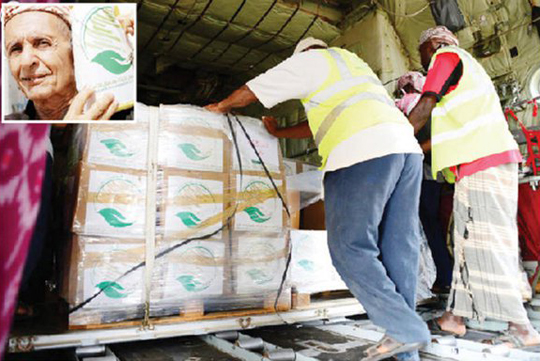Riyadh, Oct 23: The King Salman Center for Relief and Humanitarian Aid (KSRelief) on Friday distributed 30,000 food baskets to needy families in all governorates of Hodeidah in Yemen.

An estimated 180,000 people are expected to benefit from this relief, bringing the total number of beneficiaries from such aid programs until October to 400,000 as a result of joint efforts from local and international partners.
The head of KSRelief and adviser at the royal court, Abdulllah Al-Rabeeah, said in a statement that the center is implementing many projects in coordination with the United Nations and the World Food Program for food emergency aid in 16 Yemeni governorates including in Al-Mahwiet, Omran, Albaidaa, Jouf, Aal Daleh, the capital’s municipality, Marib, Abb, Taiz, Hija, Rima, Ibn, Sanaa, Thamaar, and Lahj. The project is to distribute 134,000 food baskets by the end of October benefiting 938,000 people.
Al-Rabeeah added that the center is continuing with the distribution of food baskets and tents for those that are displaced in Jouf, Mareb and Hadrmout. Items for distribution include 21,700 food baskets, 1,064 tents and 17,710 blankets. The beneficiaries to date total 130,200.
KSRelief gives direct and indirect aid to those suffering from the present crises. Aid is either for relief and/or humanitarian purposes, and in such areas as education.
The teachers training program enables Yemenis to operate educational programs include e-teaching and long-distance teaching as 500 teachers are being trained on these educational technologies being implemented for the first time to meet teacher shortages.
Education and lessons are being recorded and will be aired on television. Most educational curricula have been made digital at all school levels with e-platforms to be aired to students with additional psychological support messages by Yemeni experts.
Al-Rabeeah also said the center is coordinating this program with the Yemeni orphan’s establishment as a local partner, and for indirect support, it is cooperating with 2,000 programs with the UNFPA in protecting women and children.
In addition, the center is working with different UN organizations to help farmers in growing crops and using fertilizer, agricultural implements, pesticides, vaccines and medicines in farming and animal husbandry.
He said it is supporting civil society organizations through the UNDP through training those unemployed, supporting small projects, and supervising psychological support through civil society organizations, where 313,000 have so far benefited.
Also hostels, rehabilitation and training centers have been set up in different Yemeni governorates with help in paying rents, helping those in need for livelihood and small projects at $31 million.
He added that the medical, environmental and water projects currently carried out in Yemen are continuing. So far, these involved treating 3,601 patients for injuries, which means that there are 150 injured people treated and cared for each month.
Al-Rabeeah said the projects of treating Yemenis in Sudan and Jordan are also continuing, with relatives accompanying patients. He added these are in addition to those injured who are treated inside Yemen in private hospitals, which stand at 1,800, and that coordination is continuing with their partners.
He stressed the fact that the medical, environmental and water projects are continuing according to need, and with local and international partners in line with world standards.
He added that the center still wants to operate the Saudi Hospital in Jija that will serve 270,000 patients, and to operate the Al-Salam Hospital in Saada to serve more than 356,332 patients with helping the Al-Jamhouri Hospital, Al-Thawara Hospital, Kuwaiti Hospital and the University Hospital, all in Sanaa. This is in addition to helping the central clinic in Sanaa, the Military Hospital and providing power and oxygen.
Al-Rabeeah said KSRelief is implementing food and medical aid program interventions for boys and girls below the age of five, pregnant women and those breastfeeding through UNICEF with the number of beneficiaries till now standing at 270,0000, in all of Yemen. The project for emergency aid (public, health, pharmaceuticals, medical apparatuses and oxygen) is being conducted with WHO with 750,0000 beneficiaries so far.
He said the Marib Public Hospital is being supported with beneficiaries standing at 74,480, as is the Al-Jamhouri Hospital in Aden, that serves 57,666. Two projects are being implemented for these hospitals to provide the necessary medical cadres and this will begin implementation on Nov. 5, in coordination with the stated partners in Aden, Hadramout, Marib, Saada and Taiz.
A project to establish a prosthetic center in Marib to serve all Yemenis is also being implemented.
As to supporting environmental sanitation, Al-Rabeeah said the center is implementing a project to support water services, and sterilization and sanitation from Medical Corps International to serve around 7,869,356 beneficiaries in Sanaa, Aden, Taiz, Lahj and Marib. He said the project to provide wheelchairs to 371 health facilities has been completed. This was in coordination with the Yemeni Ministry of Health, with the support of 97 public and private health facilities, clinics, and labs through WHO, but financed by the center.
The head of the center said this comes about through the orders of Custodian of the Two Holy Mosques King Salman to help the Yemeni people.






Comments
Add new comment